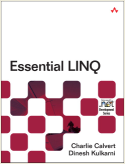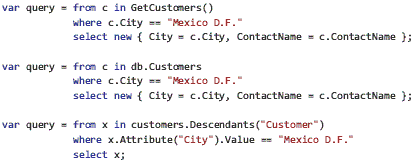
|
Chapter 3
The Essence of LINQ
Reproduced from the book
Essential LINQ. Copyrightã 2008, Pearson Education,
Inc., 800 East 96th Street, Indianapolis, IN 46240.
<<Previous
Next>>
|
Unitive
Before LINQ, developers who queried data frequently needed to master multiple
technologies. They needed to learn the following:
-
SQL to query a database
-
XPath, Dom, XSLT, or XQuery to query and transform XML data
-
Web services to access some forms of remote data
-
Looping and branching to query the collections in their own programs
These diverse APIs and technologies forced developers to frantically juggle
their tight schedules while struggling to run similar queries against
dissimilar data sources. Projects often encountered unexpected delays simply
because it was easier to talk about querying XML, SQL, and other data than it
was to actually implement the queries against these diverse data sources. If
you have to juggle too many technologies, eventually something important will
break.
LINQ simplifies these tasks by providing a single, unified method for querying
diverse types of data. Developers don’t have to master a new technology simply
because they want to query a new data source. They can call on their knowledge
of querying local collections when they query relational data, and vice versa.
This point was illustrated in the preceding chapter, where you saw three very
similar queries that drew data from three different data sources: objects, an
SQL database, and XML:

As you can see, the syntax for each of these queries is not identical, but it is
very similar. This illustrates one of LINQ’s core strengths: a single, unitive
syntax can be used to query diverse types of data. It is not that you never
have to scale a learning curve when approaching a new data source, but only
that the principles, overall syntax, and theory are the same even if some of
the details differ.
You enjoy two primary benefits because LINQ is unitive:
-
The similar syntax used in all LINQ queries helps you quickly get up to speed
when querying new data sources.
-
Your code is easier to maintain, because you are using the same syntax
regardless of the type of data you query.
Although it arises naturally from this discussion, it is worth noting that SQL
and other query languages do not have this capability to access multiple data
sources with a single syntax. Those who advocate using SQL or the DOM instead
of LINQ often forget that their decision forces their team to invest additional
time in learning these diverse technologies.
<<Previous
Next>>
Also read
Explain the concepts and capabilities of Aspect-Oriented Programming, AOP.
What is Aspect in AOP?
AOP approach addresses Crosscutting concerns. Explain
The components of AOP are advices/interceptors, introductions, metadata, and
pointcuts. Explain them
AOP vs OOPs...........
|